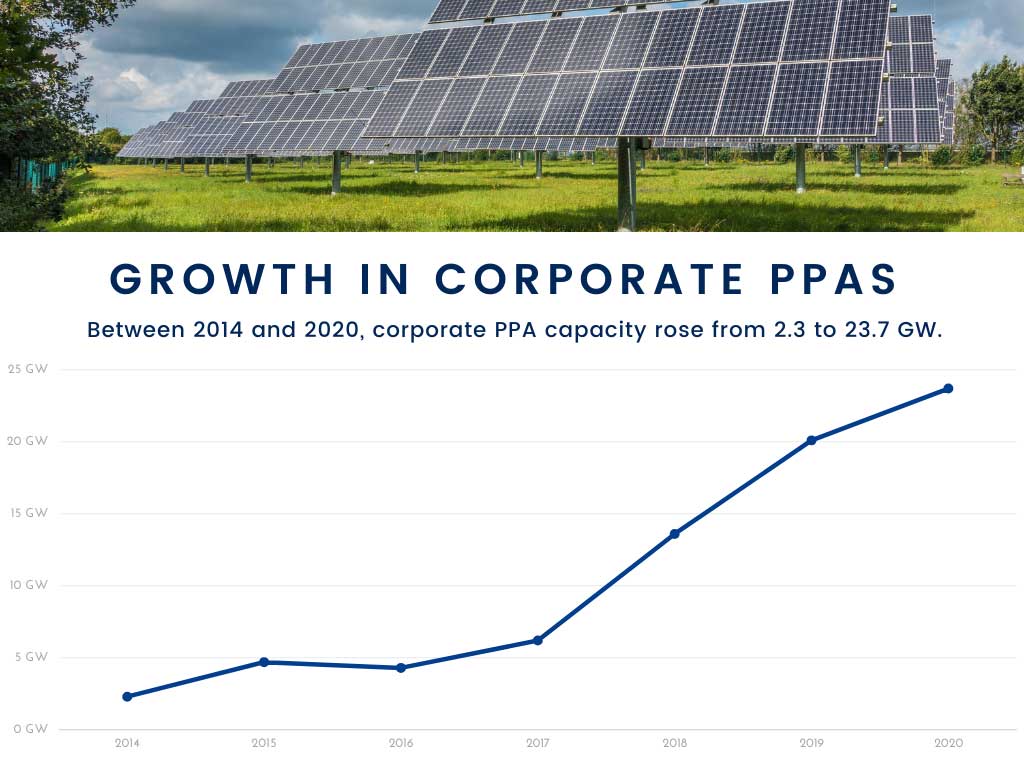As countries worldwide look to aggressively slash their greenhouse gas emissions, corporate PPAs are emerging as a way of making renewable energy adoption more practical and cost-effective for the private sector.
This is fantastic news, as an all-hands-on-deck approach is undoubtedly necessary for the scale of climate challenge, and PPAs make corporate inclusion more likely to succeed. And they’re effective for any kind of industry — technology, oil and gas, chemical, automotive, finance, construction, real estate — they can all take advantage of these contracts!
While Amazon leads as the largest PPA holder by capacity, other firms like Verizon, Meta (formerly known as Facebook), Microsoft, Dow Chemical, and General Motors are also major PPA market players.

To highlight just how remarkable PPA growth has been, let’s take a look at some recent numbers. In 2018, corporations bought 13.6 GW of clean energy through PPAs.
In 2019, this number shot up to 20.1 GW. And in 2020 — the year of volatile energy markets and initial COVID-19 disruption — 23.7 GW was purchased. The past two years then saw an astounding growth, and it’s clear that PPAs are here to stay — and that they offer the private sector a flexible opportunity to decarbonize.
In 2019, this number shot up to 20.1 GW. And in 2020 — the year of volatile energy markets and initial COVID-19 disruption — 23.7 GW was purchased. The past two years then saw an astounding growth, and it’s clear that PPAs are here to stay — and that they offer the private sector a flexible opportunity to decarbonize.
Moving forward, both internal and external pressures will continue to drive growth in the corporate PPA market.
“Investor interest in sustainability is sky high, with inflows to sustainability-focused funds growing 300% between 2019 and 2020. Companies in all sectors, including hard-to-abate ones like oil & gas and mining, are feeling the pressure to purchase clean energy and decarbonize. [Existing PPA contracts are] only just scratching the surface,” said Senior Bloomberg NEF associate Kyle Harrison.
As has been the case for the past several years, the United States dominates the corporate PPA market. Although, it should be mentioned that PPAs in Europe, Africa, and the Middle East (EMEA) nearly tripled from 2019 to 2020, going from 2.6 GW to an impressive 7.2 GW. The Asia Pacific region (APAC) has also seen record growth in corporate PPA purchases, with 2.9 GW on record in 2020.
So, why are corporate PPAs critical to widespread renewable energy adoption?
It’s because they offer businesses a strong incentive to go green by allowing them to respond to consumer and investor demands. Additionally, they help boost profitability. In the 21st century, balancing people, the planet, and profit has become a fundamental part of good business.
As Jonas Rooze, Lead Sustainability Analyst at Bloomberg NEF, said, “more than ever before, corporations have access to affordable clean energy at a global scale. Companies no longer have an excuse for falling behind on setting and working towards a clean energy target.”
In addition to reducing emissions, corporate PPAs deliver locked-in electricity costs allowing for greater long-term stability and planning. In many cases, PPAs also reduce applicable taxes paid by corporations. This is the case throughout most of Canada, for example, where a carbon tax (currently at $40 per tonne) exists on greenhouse gas emissions.
Corporate PPAs then, benefit this triple bottom line we previously spoke of: people, planet, and profit. They encourage businesses to engage in sustainable operations voluntarily, aiding overall efforts to combat climate change. Growth in corporate PPAs also fuels further innovation in cleantech industries by increasing the demand for clean energy and other public goods.
At the end of the day, companies involved in corporate PPAs can highlight their environmental credentials, which has never been better for the bottom line. The merging of sustainability and business initiatives, perhaps best represented by corporate PPAs, is already on track to produce a myriad of benefits for society.
Cleaner air, more cost-effective businesses, and increased overall price stability make corporate PPAs hard to turn down. At least, that’s true for those who can get through the complexity of PPA negotiations, which we admit can be a bit tricky. Underscoring the complexity of these agreements are the market’s dominant players, which are Amazon, Microsoft, Meta (Facebook), and Google.
Businesses pursuing PPAs need to have the time and resources to negotiate upwards of 50-100 page contracts, which can be cost-prohibitive. Solar PPAs often take around a year to complete, whereas wind PPAs (which tend to be more popular) can take double the time. In both cases, specific circumstances will impact the final timeline.
Corporate PPAs are attractive for both financial and altruistic reasons — and it’s these wide-ranging benefits that are supporting their rapid ascension to new heights in the renewable energy market. With seeds planted in Asian, African, Latin American, and European markets, corporate PPAs are likely to replicate their impressive growth trend for years.
The global corporate PPA market may still be in its infancy, but it has a bright future ahead of it.




